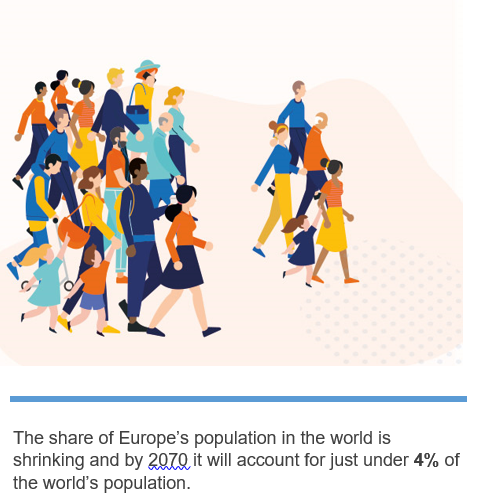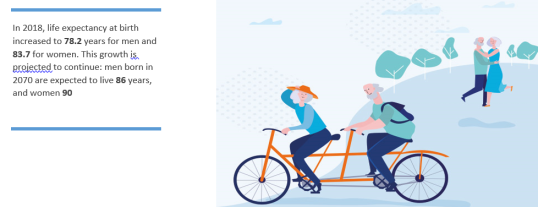As we slowly and cautiously emerge from confinement across Europe, our work continues its fast-paced rhythm towards the recovery in response to COVID-19.
On 27 May, the European Commission adopted an ambitious package “NextGenerationEU” to repair our social and economic fabric and to prepare a better future for our children and generations to come. Our response is bold and robust; it repairs damage and generates recovery, builds resilience, and guides our economies along the path of the green and the digital transitions in an inclusive manner, to ensure that no one is left behind.
In my third blog, I will focus on how we are addressing this latter aspect, because the demography strand of my portfolio is about people and their lives; it is about finding the right solutions to ensure that nobody feels left behind. Addressing demographic change is key to building a fairer and more resilient society and economy.
The demographic trends we are now witnessing have important repercussions for the future of our welfare and health systems, budgets, housing and infrastructure needs. The Coronavirus reminded us how fragile all this can be.
We have seen our elderly suffer in high numbers. Not only are they at greater risk of complications if they catch the disease, but they are also among those most affected by the lockdown and social distancing measures taken to stem the pandemic. The cost of isolation and loneliness has affected many – from those struggling to provide for their children without any support structure, to those cut off from their loved ones in another city, region or country.
On 17 June, the European Commission published its first ever Report on the Impact of Demographic Change. While shedding light on the trends it does not propose to reverse them, but rather to inform and inspire our thinking to equip us with the right tools to provide innovative solutions and to support people as they experience change.
As our median age is predicted to increase in the next few decades, we will be witnessing a shrinking of the working-age population. An older Europe which is projected to have a smaller workforce will likely increase pressure on public budgets. Europe will face a major challenge in funding its age-related spending. An ageing Europe will need a more resilient health care system to meet the growing demand for accessible and good-quality care services.
We must not forget that, overall and despite the terrible impact of Covid-19, people in Europe are living longer, healthier and more secure lives than ever before.
Nonetheless, there are still major discrepancies in life expectancy across Europe, as we have income inequality and unequal access to services in rural areas, when compared with urban areas. 31 million people live in a region facing the twin challenge of rapid population decline and low GDP per capita.
Therefore, our economies will have to adapt, and productivity will be key. We will require innovation and wider availability of technological products and services, with a more circular and digital economy creating new business models and ways of working. Essentially, we need to level the playing field, so that opportunities do not only cluster in urban areas, but are also available elsewhere.
Automation and new, cleaner technologies can help boost labor productivity in the future. Europe needs a highly-skilled, well-trained and adaptable workforce. It will be all the more important to ensure that lifelong learning can become a reality. The EU must support those who will have to learn new skills or change jobs. In the coming years, millions of Europeans will have to upskill or reskill. Attracting skills and talent from abroad, including through legal migration, will also help to address labor market needs, in an inclusive and non-discriminatory manner.
The European Union can help Member States and regional governments in responding to demographic change. European funds, in this context, can provide real support and can be of benefit to regions in need. When looking at the Commission’s proposal for the Multiannual Financial Framework or the ‘Next Generation EU’ recovery fund, we can see a link with demography in every single point. The Communication even makes a specific reference to demography as being a key consideration in the recovery.
Following the publication of the Report on the impact on demographic change, the next steps envisaged will be a Green Paper on Ageing and a Long-term vision on Rural Areas. With these two initiatives, the Commission will address two key challenges that affect the lives of many people. Further work is then to follow, including on the issue of loneliness.
We must ensure that no region and no person is left behind, which will also help reinforce our democracy. This is why this Commission has, for the first time, a portfolio specifically dedicated to Democracy and Demography, and it is why this topic will also feature in the Conference on the Future of Europe. Citizens will play a leading role in building a more resilient, sustainable and fair Union. While many of the competences in these areas are in the hands of Member States, the Commission is ready to lead the way by identifying the areas that require attention, and in supporting national, regional and local action by providing guidelines, standards, data and best practices.
If you are curious to find out more about the Impact of Demographic change, please visit our new, dedicated webpage.
Until next time, keep well and stay healthy!
Details
- Publication date
- 30 June 2020
- Author
- Directorate-General for Communication



